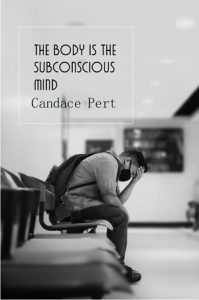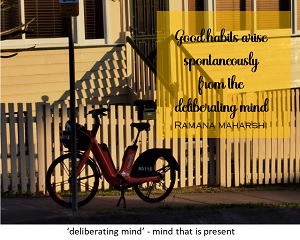Have you ever noticed how something that you do routinely and frequently like playing a tune on your favourite instrument or singing a song from the distant past or driving to a particular destination or recalling a phone number is never a problem when you do it at the usual speed that you would normally do it and without actually thinking about it? But as soon as you try to slow it down and bring your conscious mind to the action, you seem to lose your place, you stutter or ‘forget’ the lines. You find that you have to go back and sing or play the tune as you used to, to help you ‘recall’? Have you experienced that? I’m sure you have. Have you ever wondered why?
It’s because that information has been stored in your body so that now, your body has become more efficient at retrieving that information than your conscious mind is! It’s an evolutionary efficiency that the bodymind, which is an amazing learning system, has developed in order to free up the cognitive resources of your conscious mind. These resources can be better used for such things as evaluation and decision-making.
Habit is something that the body knows to do better than the mind – Dr Joe Dispenza
Something that is done repeatedly is a habit and because it is done repeatedly, it doesn’t require our conscious attention. The body can very efficiently perform repetitive actions on ‘autopilot’ without instructions from our conscious mind.
Now, this is all wonderful if we are happy with the habit. But what if we wish to change the habit? Or replace it with a different one? What if we realize that some habits are actually working against us and preventing us from achieving our goals?
The mind-body love affair
Candice Pert, a neuroscientist, coined the term bodymind (without hyphen) because her research showed that the body and mind are not two things but one, just different aspects of the same system. The body, she said, is the subconscious mind where all information is stored and from which information is retrieved. She distinguished the subconscious mind (body) from the conscious mind which is where active processing of information happens – new information is received or retrieved, analyzed, evaluated and decisions are made.
Her pioneering work also showed that thoughts generate chemicals whose physiological expression in the body takes the form of what we call sensations and emotions. It was very clear to Candice Pert that thoughts have a critical role in cell function including gene expression. Bruce Lipton, a biologist who taught medical students also came to similar conclusions and his work has become part of the body of research and knowledge known as epigenetics.
Now, it had long been known, especially in the field of psychology, that emotions play a critical role in our sense of well-being, our ability to set and achieve goals, our relationships and our learning. But that our thoughts and the emotions associated with them had a direct impact on mental and physical well-being seemed like a bridge too far for most scientists. Not only had there been little research in this field, there was considerable opposition to such suggestions. After all, the fields of psychology, science and medicine were fairly discrete disciplines, and each was happy to remain so.
When medical professionals came across patients with illness that seemed to have no ‘physical’ or ‘biological’ expression or explanation, they described it as ‘psychosomatic’, a somewhat loose and dismissive way of saying ‘it’s all in your head’. So, even though the word ‘psychosomatic’ actually refers to mind (psycho) and body (soma), the irony was that the link between mind and body was not taken seriously.
Today, thanks to research in a variety of disciplines including neuroscience and epigenetics, more scientists and lay people are taking the link between body and mind far more seriously. So, what has all of this got to do with habits?
The trickily easy way to change habits
If you accept that the body and mind are so integrated, each influencing the other all the time as science now acknowledges, you might be able to see how our habits are activated and how, if we wish to change and replace them, we will have to engage both aspects of our consciousness – body and mind. Mere thinking or willpower isn’t going to do it. We will need to change the emotional (chemical) triggers that our body is receiving from our thoughts. And that means…
We must change our thinking and feel the feelings.
Now, changing our thinking is really about changing the chemical messages that we send to our body. And until these chemical messages change, our body and its habits will not change.
When I talk about habits, I am referring to all aspects of a habit – cognitive, behavioural, chemical and emotional. When you change your thinking (cognitive) and you allow for a different emotion and its associated chemicals (peptides, hormones, neurotransmitters etc), you are quite literally changing what happens in your body and how it responds (behaviour).
You gotta feeeeeel it babe
Now, we know that we tend to learn better, sleep better, eat better, relate better, work better when we feel good (a result of the way mind and body relate to each other). But where do we experience this feeling of ‘good’ if not In our body?
We can certainly think ‘good’ thoughts (eg I am a kind person, I am healthy and happy, I forgive so and so…) but until this translates into chemical/emotional effects in our body, we will not have completed the whole process of laying down new neurological tracks and new emotional/chemical patterns of a new habit to replace an old one.
If I could put it simply:
You change and replace habits by creating new emotional patterns that associate with the new habit.
Now here’s something pretty amazing. It doesn’t matter how you generate new emotional associations and it doesn’t matter what the original source or trigger for that emotion is. The only thing that matters is that you generate a feel-good emotion. Let me explain.
An example
Let’s say I want to replace my habit of dreading a certain type of meeting that I routinely attend. The emotional association I have with that meeting is one of dread, dislike, reluctance. I have now decided that rather than dread the meeting, I want to feel more positive about it. Now, my bodymind already has a pattern or habit of dread-dislike-reluctance associated with the meeting. How do I change that?
Like this:
I decide that instead of dread, dislike and reluctance, I’d like to feel joy, excitement, interest and enthusiasm. But how the heck do I make this happen? After all, every time I think about the meeting, the dread-dislike-reluctance habit or emotional pattern is triggered. So, here’s one thing I could do:
I think of a past situation (that may be completely unrelated to this meeting) when I did feel joy, excitement, interest or enthusiasm. It doesn’t have to be all of these, just one will do. I allow myself to recall this experience. As I do, I find that my body’s memory is activated. I actually do feel excitement or interest or joy! I allow myself to feel this as much as I can. Then I think of my meeting and because my body is now flooded with these wonderful emotions (and their related chemicals), a new association is created! New neurological pathways are laid down and the tentative threads of a new emotional pattern around the meeting are created!
Can you see why it’s important to recognize your habits by paying attention to your bodymind?
Finally, it may not have been obvious to you but just about everything is stored as habit in the subconscious mind (body) – the way you look, the way you see something, hear something, feel about someone, speak, sit, stand, hold a fork, react to triggers (eg with fear, anxiety, sadness…), the way you learn, how you think of something…It’s all habit. And given that it’s only when we become aware of something that we can we do anything to change it, we need to get serious about paying attention.
Is there a habit you want to change?
MENTORING
Let Life express itself intoxicatingly, uniquely, powerfully and limitlessly in, as and through you. Don’t settle, whatever your age. Know your true Self. Follow your Bliss. Live the Life that you know you want to! Contact me here.
MINDFULNESS ONLINE
Join me every week to sit in the presence of your true Self and experience the greatness of Life flowing naturally, effortlessly and powerfully in, as and through you!

